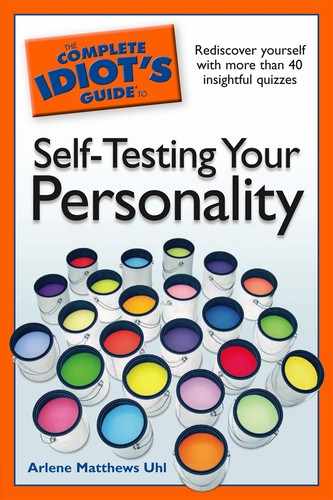Quiz 15
Am I a Strong Speaker?
With business competition fierce, and with so many ideas and technologies competing for attention, today it’s more important than ever to have speaking skills in the workplace—and everywhere you may be networking. This assessment is designed to find out how well you perform in speaking situations. But it is also constructed to test your knowledge of certain essential communication dynamics. Your score will represent how much you know about communicating with an audience and how well you put what you know into practice.
Take the Test
Indicate whether you think each statement is TRUE or FALSE:
1. I always prepare and rehearse before a presentation.
2. After hearing my presentation, people can distill its main message into one sentence.
3. I feel a bit of nervous energy before a presentation.
4. Typically, people forget 40 percent of what they hear by the end of a presentation.
5. I try to anticipate difficult questions audience members might ask.
6. I am always terrified someone will ask me a question I can’t answer.
7. Audience interest is always highest at the start of a speech or presentation.
8. I am always looking to add new information to a standard presentation.
9. I never rephrase what I say or how I say it, no matter who my audience is.
10. I pay a lot of attention to choosing just the right opening words.
11. If I lose my place I get very flustered.
12. I always start a presentation with a popular joke I’ve memorized.
13. Using visual images can increase audience retention.
14. I always support what I say with evidence like facts, figures, and examples.
15. There’s no such thing as putting too much information in a presentation.
16. People remember anecdotes more than any other type of material.
17. Lincoln’s Gettysburg Address was 10 sentences long.
18. I prepare a presentation based strictly on what slides I already have.
19. I put as much information as possible on each slide.
20. Interactive techniques like polling the audience increase audience attention.
21. I rarely move around or gesture when I am speaking.
22. I like to use analogies and comparisons in my talks.
23. I avoid smiling during presentations because it makes me seem less credible.
24. I always have a backup plan should my slide projector or other technology fail.
25. I would feel comfortable claiming my share of time on a panel discussion.
Scoring and Explanation
Give yourself one point for each of your answers that matches the following answer key:
1. TRUE. Practice is a must.
2. TRUE. People should come away knowing your headline.
3. TRUE. A little nervous energy keeps you vibrant.
4. TRUE. This is all too true, so repeat what’s important in various ways.
5. TRUE. You can’t be too prepared.
6. FALSE. Good speakers have answers to tough questions at the ready.
7. TRUE. Make your strongest points early.
8. TRUE. Good speakers keep their material fresh.
9. FALSE. You’ll get stale if you don’t change things up.
10. TRUE. The opening is the most critical part.
11. FALSE. No reason to panic—the audience is not your enemy.
12. FALSE. Humor can be effective, but memorized jokes tend to fall flat.
13. TRUE. People have a higher retention when words are paired with images.
14. TRUE. Proving your points makes you credible.
15. FALSE. People blank out if you overload information.
16. TRUE. Everyone loves a good story.
17. TRUE. Lincoln was a master of brevity and depth.
18. FALSE. Create slides to support messages you want to share.
19. FALSE. Crowded slides distract from you and confuse the audience.
20. TRUE. It pays to get everyone involved.
21. FALSE. It’s boring to be a statue.
22. TRUE. Analogies give people examples that make sense in everyday life.
23. FALSE. Unless your news is dire, smiling helps you convey any message.
24. TRUE. Stuff happens—be ready!
25. TRUE. Panel discussions are no time to be shy.
• A score of 20-25 indicates that you are an exceptionally strong speaker. You have an implicit understanding of how people really listen. You also have good habits and sound instincts about what to do in front of an audience. Chances are high that your speaking style and penchant for clear communication will help you get ahead.
• A score of 13-19 indicates that you have some very strong points as a speaker, but could improve some aspects of your skill set. Take a look at where your responses diverged from the answer key to get an idea of what you might learn more about. There are many good books on presentation skills that can help you on your way. Or you can join a group like Toastmasters.
• A score of 12 or below indicates that public speaking is probably not your strong suit. Don’t worry; you’re hardly alone. As comedian Jerry Seinfeld once commented, many people would be more comfortable being a corpse than giving a eulogy. But speaking skills are increasingly important in the workplace; in most occupations it won’t do to duck under your desk every time information needs to be conveyed or a pitch needs to be made. If you’ve taken this quiz, it is probably because you already have an interest in improving your skills, so set a course of action and stick to it. Books, DVDs, and workshops on public speaking abound. If you work for a large company your employer may already have a speaking coach on hand to train employees. Please note: if you took Quiz 1 in this book and determined that you are an introvert, that’s still no excuse. The point of training is to be armed with tools and techniques that will help you gain confidence in public situations.
..................Content has been hidden....................
You can't read the all page of ebook, please click here login for view all page.
